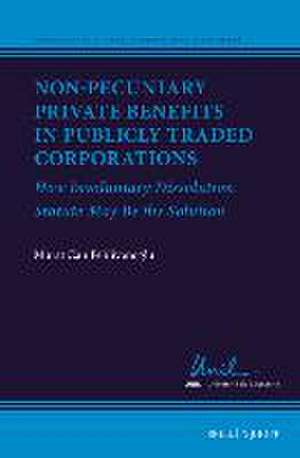Non-Pecuniary Private Benefits in Publicly Traded Corporations: How Involuntary Dissolution Statute May Be the Solution: International and Comparative Business Law and Public Policy, cartea 5
Autor Murat Can Pehlivanogluen Limba Engleză Hardback – 4 oct 2023
Preț: 645.02 lei
Preț vechi: 786.61 lei
-18% Nou
Puncte Express: 968
Preț estimativ în valută:
123.44€ • 128.14$ • 102.93£
123.44€ • 128.14$ • 102.93£
Carte indisponibilă temporar
Doresc să fiu notificat când acest titlu va fi disponibil:
Se trimite...
Preluare comenzi: 021 569.72.76
Specificații
ISBN-13: 9789004686502
ISBN-10: 9004686509
Dimensiuni: 155 x 235 mm
Greutate: 0 kg
Editura: Brill
Colecția Brill | Nijhoff
Seria International and Comparative Business Law and Public Policy
ISBN-10: 9004686509
Dimensiuni: 155 x 235 mm
Greutate: 0 kg
Editura: Brill
Colecția Brill | Nijhoff
Seria International and Comparative Business Law and Public Policy
Notă biografică
Murat Can Pehlivanoğlu, S.J.D. (2018), San Francisco Golden Gate University, is Assistant Professor of Law at Istanbul Kent University. He has published widely on commercial law and corporate law, and teaches at several universities.
Cuprins
1Introduction
1 Introduction of the Issue
2 Importance and Beyond
3 Framework for Analysis
2Defining the Concepts and the Flaw
1 Non-pecuniary Private Benefits
1.1Generally
1.2Types of Non-pecuniary Private Benefits
1.3Justification for Mandatory Protection
1.3.1 General Considerations
1.3.2 Using the “Nexus of Contracts” Theory
2 Influencing Shareholder
3 The Transaction-Based System
3.1Generally
3.2Rationale of Transaction-Based Systems
4 Conclusion
3Components of the Transaction-Based System in Turkish Law
1 Generally
2 Specific Provisions
2.1Fundamental Corporate Changes
2.2Concealed Distribution of Capital and Related-Party Transactions
2.3Liability in Corporate Groups
2.4Securities Authority’s Miscellaneous Powers
3 Conclusion
4The “Reasonable Expectations” Standard
1 Generally
1.1Theoretical Framework of the “Reasonable Expectations” Conception
1.2Basic Reasonable Expectations’ Current Protection in Corporate Law
1.3Purview of the Basic Reasonable Expectations
1.3.1 Expectations Regarding the Corporate Purpose
1.3.2 Expectations Regarding the Management
2 Shareholder Oppression Law in the U.S.
2.1Generally
2.2Legal Nature of the Action
2.3Delaware Law
2.4New York Law
2.5Remedies
3 Components of the “Reasonable Expectations” Standard
4 Justifications for Application to the Publicly Traded Corporation
4.1Generally
4.2Challenges in Defending the Imposition
4.3Rethinking the Conception
4.3.1 Generally
4.3.2 Sources
5 Conclusion
5Involuntary Dissolution Action in Turkish Law
1 Generally
2 Legal Nature of the Action
3 Elements of the Cause of Action
3.1Generally
3.2Effect of the Mandatory Nature of Corporate Law
4 The “Just Cause” Concept
4.1Current Interpretation
4.2Using the “Reasonable Expectations” Standard
5 Remedies
5.1Remedying Non-pecuniary Private Benefit Extractions
5.2The Problem of Direct Compensation
6 Application to Non-pecuniary Private Benefit Extractions
7 Conclusion
6Conclusion
Bibliography
Index
1 Introduction of the Issue
2 Importance and Beyond
3 Framework for Analysis
2Defining the Concepts and the Flaw
1 Non-pecuniary Private Benefits
1.1Generally
1.2Types of Non-pecuniary Private Benefits
1.3Justification for Mandatory Protection
1.3.1 General Considerations
1.3.2 Using the “Nexus of Contracts” Theory
2 Influencing Shareholder
3 The Transaction-Based System
3.1Generally
3.2Rationale of Transaction-Based Systems
4 Conclusion
3Components of the Transaction-Based System in Turkish Law
1 Generally
2 Specific Provisions
2.1Fundamental Corporate Changes
2.2Concealed Distribution of Capital and Related-Party Transactions
2.3Liability in Corporate Groups
2.4Securities Authority’s Miscellaneous Powers
3 Conclusion
4The “Reasonable Expectations” Standard
1 Generally
1.1Theoretical Framework of the “Reasonable Expectations” Conception
1.2Basic Reasonable Expectations’ Current Protection in Corporate Law
1.3Purview of the Basic Reasonable Expectations
1.3.1 Expectations Regarding the Corporate Purpose
1.3.2 Expectations Regarding the Management
2 Shareholder Oppression Law in the U.S.
2.1Generally
2.2Legal Nature of the Action
2.3Delaware Law
2.4New York Law
2.5Remedies
3 Components of the “Reasonable Expectations” Standard
4 Justifications for Application to the Publicly Traded Corporation
4.1Generally
4.2Challenges in Defending the Imposition
4.3Rethinking the Conception
4.3.1 Generally
4.3.2 Sources
5 Conclusion
5Involuntary Dissolution Action in Turkish Law
1 Generally
2 Legal Nature of the Action
3 Elements of the Cause of Action
3.1Generally
3.2Effect of the Mandatory Nature of Corporate Law
4 The “Just Cause” Concept
4.1Current Interpretation
4.2Using the “Reasonable Expectations” Standard
5 Remedies
5.1Remedying Non-pecuniary Private Benefit Extractions
5.2The Problem of Direct Compensation
6 Application to Non-pecuniary Private Benefit Extractions
7 Conclusion
6Conclusion
Bibliography
Index





